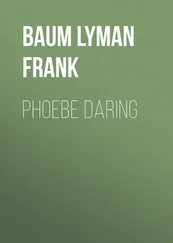After fifteen years of social work education, I was sure of one thing: Connection is why we’re here; it is what gives purpose and meaning to our lives. The power that connection holds in our lives was confirmed when the main concern about connection emerged as the fear of disconnection; the fear that something we’ve done or failed to do, something about who we are or where we come from, has made us unlovable and unworthy of connection. I learned that we resolve this concern by understanding our vulnerabilities and cultivating empathy, courage, and compassion—what I call shame resilience.
After developing a theory on shame resilience, and getting clear about the effect of scarcity on our lives, I wanted to dig deeper—I wanted to know more. The problem is that there’s only so much you can understand about shame and scarcity by asking about shame and scarcity. I needed another approach to get under the experiences. That’s when I had the idea to borrow a few principles from chemistry.
In chemistry, especially thermodynamics, if you have an element or property that is too volatile to measure, you often have to rely on indirect measurement. You measure the property by combining and reducing related, less volatile compounds until those relationships and manipulations reveal a measurement of your original property. My idea was to learn more about shame and scarcity by exploring what exists in their absence.
I know how people experience and move through shame, but what are people feeling, doing, and thinking when shame doesn’t constantly have a knife to their throats, threatening them with being unworthy of connection? How are some people living right alongside us in this culture of scarcity and still holding on to the belief that they are enough? I knew these people existed because I had interviewed them and used some of the incidents from their data to inform my work on empathy and shame resilience.
Before I dove back into the data, I named this study “Wholehearted Living.” I was looking for women and men living and loving with their whole hearts despite the risks and uncertainty. I wanted to know what they had in common. What were their main concerns, and what were the patterns and themes that defined their Wholeheartedness? I reported the findings from that study in The Gifts of Imperfection and an academic journal article that will be published in late 2012 or early 2013.
Vulnerability has consistently emerged as a core category in my work. It was a critical component in both my study on shame and my study on Wholeheartedness, and there’s even a chapter on it in my dissertation on connection. I understood the relationships between vulnerability and the other emotions that I’ve studied, but after years of dropping deeper and deeper into this work, I wanted to know more about vulnerability and how it worked. The grounded theory that emerged from this investigation is the subject of this book and another academic article in press.
DESIGN
As I’ve mentioned, grounded theory methodology, as originally developed by Glaser and Strauss and refined by Glaser informed the plan of research for my studies. The grounded theory process consists of five basic components: theoretical sensitivity, theoretical sampling, coding, theoretical memoing, and sorting. These five components were integrated by the constant-comparison method of data analysis. The goal of the research was to understand the participants’ “main concerns” related to experiencing the topic being examined (e.g., shame, Wholeheartedness, vulnerability). Once the main concerns emerged from the data, I developed a theory that explains how the participants continually resolve their concerns in their daily lives.
SAMPLE
Theoretical sampling, the process of data collection that allows for the generation of theory, was the primary sampling method that I used in this study. When using theoretical sampling, the researcher simultaneously collects, codes, and analyzes data and uses this ongoing process to determine what data to collect next and where to find them. In line with theoretical sampling, I selected participants based on the analysis and coding interviews and secondary data.
One important tenet of grounded theory is the idea that researchers should not assume the relevance of identity data, including race, age, gender, sexual orientation, class, and ability. Although the relevance of these variables was not assumed, purposive sampling (intentionally sampling across identity data) was used with theoretical sampling to ensure that a diverse group of participants were interviewed. At certain points during my research, identity data indeed emerged as relevant, and in these cases purposive sampling continued to inform the theoretical sample. In categories where identity did not emerge as relevant, theoretical sampling was used exclusively.
I interviewed 750 female participants, approximately 43 percent of whom identified themselves as Caucasian, 30 percent as African-American, 18 percent as Latina, and 9 percent as Asian-American. The female participants’ ages ranged from eighteen to eighty-eight years, with a mean of forty-one. I interviewed 530 men, approximately 40 percent of whom identified themselves as Caucasian, 25 percent as African-American, 20 percent as Latino, and 15 percent identified as Asian. The mean age of the men interviewed was forty-six (the range was eighteen to eighty).
Although grounded-theory methodology often yields theoretical saturation (the point at which no new conceptual insights are generated and the researcher has provided repeated evidence for his or her conceptual categories) with far fewer than my total 1,280 participants, three interrelated theories emerged with multiple core categories and numerous properties informing each category. The nuanced and complex nature of shame resilience, Wholeheartedness, and vulnerability necessitated the large sample size.
A basic tenet of grounded theory is “all is data.” Glaser writes, “The briefest comment to the lengthiest interview, written words in magazines, books and newspapers, documents, observations, biases of self and others, spurious variables, or whatever else may come the researcher’s way in his substantive area of research is data for grounded theory.”
In addition to the 1,280 participant interviews, I analyzed field notes that I had taken on sensitizing literature, conversations with content experts, and field notes from my meetings with graduate students who conducted participant interviews and assisted with the literature analysis. Additionally, I recorded and coded field notes on the experience of taking approximately 400 master and doctoral social-worker students through my graduate course on shame, vulnerability, and empathy, and training an estimated 15,000 mental health and addiction professionals.
I also coded over 3,500 pieces of secondary data. These include clinical case studies and case notes, letters, and journal pages. In total, I coded approximately 11,000 incidents (phrases and sentences from the original field notes) using the constant comparative method (line-by-line analysis). I did all of this coding manually, as software is not recommended in Glaserian-grounded theory.
I collected all of the data with the exception of 215 participant interviews that were conducted by graduate social-work students working under my direction. In order to ensure inter-rater reliability, I trained all research assistants and I coded and analyzed all of their field notes.
Approximately half of the interviews were individual meetings and the other half happened in dyads, triads, and groups. Interview times ranged from forty-five minutes to three hours, with an average of approximately sixty minutes. Adjusted conversational interviewing was utilized because it is regarded as the most effective grounded theory approach to interviewing.
Читать дальше
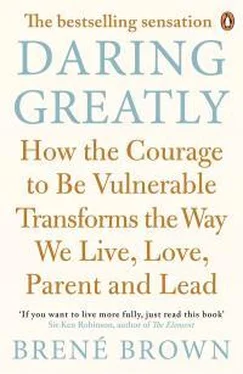
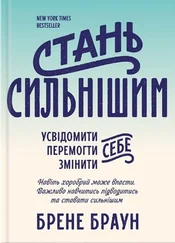
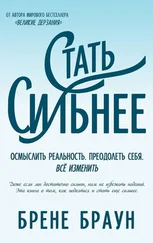
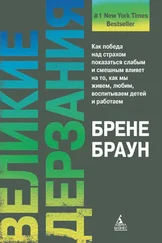


![Брене Браун - Вопреки. Как оставаться собой, когда всё против тебя [litres]](/books/436389/brene-braun-vopreki-kak-ostavatsya-soboj-kogda-v-thumb.webp)




